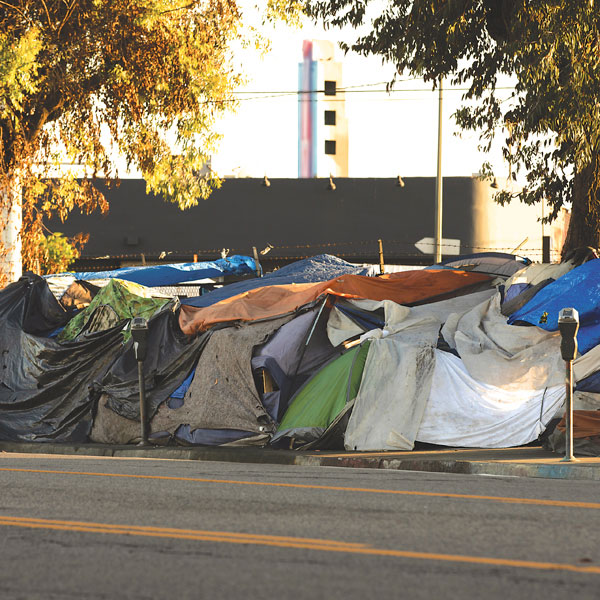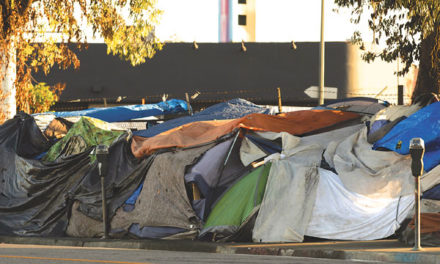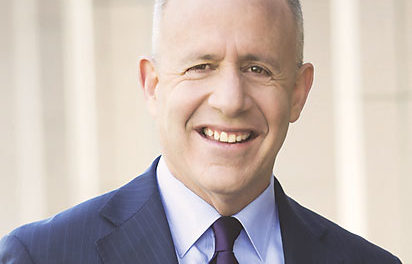Selective Enforcement
City needs to get serious about clearing sidewalks
By Jeff Harris
February 2023
Publisher’s Note: With eight productive years as a City Council member, Jeff Harris left office in December after being redistricted out of the East Sacramento community where he lives. We asked Harris to join us as a monthly columnist reporting on City Hall.
Nobody should have to step into a traffic lane to get around a homeless encampment. That’s why I proposed a sidewalk ordinance during my final year on City Council.
Our children need safe routes to school. We must comply with federal accessibility laws so people with disabilities can stay mobile. My goal with the sidewalk ordinance was to create a safe, 4-foot passage on our sidewalks, even where homeless encampments are set up.
The sidewalk ordinance became law last September. I expected the new rule would make it safe to be a pedestrian again. I’m sad to say that hasn’t happened.

Under the new ordinance, obstructing a sidewalk in Sacramento is a misdemeanor. When we put the rule together, Mayor Darrell Steinberg claimed making obstructions a citable offense was too punitive to homeless people. He wanted enforcement language removed.
City Attorney Susana Alcala Wood and I argued that without an enforcement recourse, the ordinance was meaningless. We won the debate. The misdemeanor language stayed in.
But that wasn’t the end of the story. Two councilmembers, Jay Schenirer and Katie Valenzuela, inserted a provision that any possessions a homeless person couldn’t deal with to clear a sidewalk must be bagged, tagged and stored until the individual retrieves them.
The storage requirement creates about $1 million in extra costs for the city. It greatly complicates enforcement of the sidewalk law.
Let’s make one thing clear. The sidewalk ordinance was never intended to confiscate possessions or punish homeless people.
Rather, the goal is to demand that people who live in street-bound poverty exhibit some minimal, basic responsibility as citizens. Simply put, we want them to keep their space more confined for the safety of everyone.
The city did substantial outreach before threatening citations. Many sidewalks were cleared, only to be obstructed again within a few days.
Here’s the reality. A majority of people who live outdoors deal with mental infirmities, drug addiction or both. Asking them to voluntarily comply with the sidewalk ordinance is a zero-sum game, although at least 10 percent happily comply. Like housed residents, the homeless community is a mixed and complex constituency.
Significant resources and staff are needed to enforce the sidewalk ordinance, but it must be done. City Council has been divided over responses to homelessness, with the result that we incrementally lost control of our city. The sidewalk ordinance gives us back some control, 4 feet at a time.
We’ve seen entire blocks decimated by trash and lawlessness, largely in support of drug abuse. Citizens must be proactive in letting their local representatives know that the situation is intolerable, that we want Sacramento clean and safe again!
To enforce the sidewalk ordinance (and other laws) requires more code officers, more community response staff and more coordination with police. Those are expensive realities.
Perhaps a more viable approach is to fund and empower our neighborhood business districts to help with outreach and cleanups. They largely hold the frontlines already, and do an admirable, under-resourced job.
City Council must make the homeless crisis its top priority and act with compassion and a firm hand. City Hall must allocate resources to get the work done.
For decades, we experienced a schism between the city and Sacramento County on where responsibility lies with our homeless response.
I served on homelessness committees with the county for seven years. Late in 2022, we made a breakthrough and forged an agreement that will lead to a collaborative approach for more effective outreach to the homeless and coordinated access to services.
The recent agreement has promise, but will take months or years to take effect. It will not clean up our streets anytime soon.
For now, we need more managed temporary shelter space. We need to address behavioral health issues. And we must enforce the sidewalk ordinance.
Jeff Harris represented District 3 on the Sacramento City Council from 2014 to 2022. He can be reached at cadence@mycci.net.















